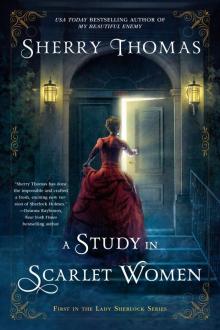- Home
- Sherry Thomas
The Art of Theft Page 4
The Art of Theft Read online
Page 4
As complicated as his personal circumstances made things, his happiness was uncluttered, the joy he radiated as pure and simple as that of a boy who had just met the puppy that was going to turn his childhood magical.
When Lord Ingram had been forced to admit his sentiments toward Charlotte, it had happened under police questioning. The heaviness of the occasion had been oppressive, the reluctance of his confession unleavened by any flutter of gladness.
Perhaps that was the reason their brief stint as lovers had been so easy and lighthearted, relatively speaking. He had made it clear that the liaison would take place only for reasons of strategy and safety. And since they both knew there would be no future, they had allowed themselves to enjoy the present.
An addictive pleasure, as it turned out.
She studied the glow upon Mr. Marbleton’s face, his agreeable features made doubly so by the sincerity and elation of first love. Did he not realize how unlikely it was for his budding romance to blossom any further? Did he not understand that to seek permanent ties would be to place his own needs far, far above Livia’s?
But that glow faded. He fell silent. When he looked at Charlotte again, it was with a gentle but deep-seated melancholy. “She was relieved that I didn’t propose to her.”
“Good. I should think less of you if you did.”
“So would I.” He sighed, then smiled beatifically. “But let’s speak of happier things. I, for one, am delighted that I will see Miss Olivia again within days.”
“Oh, are you not also departing these shores?”
“Yes, yes, but I have convinced my family to let me remain here a little longer. Which”—he lifted the letter from Livia and proffered it with theatrical flair—“brings me to the purpose of my call. Miss Olivia Holmes, I have come to realize, has a devious mind. And rather breathtaking audacity.”
Livia had long struggled with the sense of worthlessness that their parents had, carelessly or intentionally, instilled in her. Charlotte, on the other hand, never doubted that she could be both bold and clever—she needed only to see past her own doubts. “What does she have in mind?”
“She would very much like for you forge a letter, purportedly from my mother—Mrs. Openshaw, that is—inviting her to spend Christmas with the Openshaw family,” declared Mr. Marbleton, clearly relishing every word. “She reasons that Sir Henry and Lady Holmes, the latter especially, are desperate enough to marry her off that they would seize any opportunity to thrust her into the company of an eligible young man.
“Given that the Holmeses and the Openshaws haven’t known one another very long, Lady Holmes would have accompanied Miss Olivia—under different circumstances. I understand that an attractive widow recently took up residence in the village and that Lady Holmes is intent that no friendship should develop between Sir Henry and this newcomer. Therefore there is no moment like the present for Miss Livia to make a bid for temporary freedom.”
Charlotte nodded. Lady Holmes tended to be riled by the presence of good-looking, experienced women nearby, because her husband almost invariably sniffed at their skirts—and sometimes managed to get under those skirts. Another woman, faced with Sir Henry’s incurable wandering eye, would have resigned herself to the inevitable and concentrated her efforts on her one remaining eligible daughter. But Lady Holmes was ruled by her reactions, and she reacted with far more rancor and bile to her husband’s disrespect than anything Livia had or hadn’t done.
“I already spoke to my family,” continued Mr. Marbleton, “and they are amenable, since Miss Olivia’s goal is to spend time not with us, but with you. She believes that once you have dispatched the letter, you can send Mrs. Watson in disguise to retrieve her from home, as a chaperone from Mrs. Openshaw. And she hopes that once she leaves home, she will be able to stay with you until mid-January.”
Charlotte smiled. “This is an excellent plan. And has every chance of success.”
“I am counting on it.”
“Does your family know that she is the reason you’re delaying your departure from Britain?”
“Of course. No secrets, remember? I even begged my mother to write the letter herself, but she refused.”
“Hardly surprising.”
After all, their goal was to dissuade him from this courtship, not to make it easier for him to see Livia.
He grinned, undaunted. He was young, his family—with their kind but firm opposition—had left the country, and he was about to see the object of his affections again. He would probably still grin even if he stepped out of Mrs. Watson’s house and was drenched by the splash from a speeding carriage. “Anyway, Miss Olivia has passed along a short note that my mother wrote to Lady Holmes. She also composed the missive that she wants you to copy.”
Charlotte at last opened the envelope. There was a letter from Livia, confirming what Mr. Marbleton had said. There was the handwriting sample. And there was the text to be forged.
She handed the last to Mr. Marbleton. “Does the tone strike you as sufficiently similar to your mother’s?”
Mr. Marbleton glanced down. “Ah, I see what you mean. It lacks a certain imperiousness. May I make some changes?”
She showed him to the desk at the window, where he proceeded to redraft the note, deleting any words or phrases that conveyed any measure of deference.
“Is my sister overawed by Mrs. Marbleton?” Charlotte asked mildly.
Livia had always been easily intimidated by authoritative women—perhaps from having lived in the shadow of their high-handed eldest sister, Henrietta. But Henrietta was nothing and no one next to Mrs. Marbleton.
“At the present, yes.” Mr. Marbleton thought for a moment. “But if I have to worry about her getting along with anyone in the family, it would be my sister.”
“She did say to me that she didn’t think Miss Olivia would last a week in the kind of life you lead.”
“That would be an exaggeration. We’ve had many uneventful weeks.”
And the rest? Charlotte thought but didn’t ask.
“Frances means well, but she can be overbearing at times.” He shook his head. “But Miss Olivia need not worry about Frances. Now that she’s left the country, chances are slim that they will see each other again, let alone—”
He shrugged.
Let alone become related?
She changed the subject. This was something Livia had taught her. When you don’t know what to say, or if you aren’t sure you won’t say something wrong, start a different topic. “When did you and your family call on mine to take your leave?”
“Yesterday evening.” He seemed glad to move away from the impossibility of any real future with Livia.
“In that case it wouldn’t seem overly hasty for a letter purportedly from Mrs. Openshaw to reach my parents tomorrow, on the evening post.”
As if Mrs. Openshaw, waking up on her second morning in London, had the idea drop into her head and decided to give in to her impulse.
“Excellent!” enthused Mr. Marbleton. “Will you perform the forgery yourself?”
The front bell rang. They both looked up, Mr. Marbleton with a trace of alarm in his eyes. Charlotte rose and moved to the parlor’s door and listened as Mr. Mears spoke to the caller below.
Then she returned to her seat, took a deep breath, and said, “No, Mr. Marbleton, I will not forge the letter myself.”
* * *
Even before Mr. Mears announced him, Lord Ingram’s gaze already fell on Holmes.
She looked up, and Lord Ingram could almost swear that she smiled at him with her eyes. His heart skipped a beat. But the next moment her expression assumed the same slight aloofness she had worn years ago as she regarded the artifacts he had unearthed from the ruins of a Roman villa on his uncle’s property—as if they were mere curiosities, and not precious keys to a long-lost era.
She rose. “My lord,
how do you do?”
“Miss Charlotte.”
The man in the blue padded chair across from hers also rose. Lord Ingram regarded him for a moment. “Ah. Mr. Marbleton, is it not?”
They had never met, but Lord Ingram had seen Stephen Marbleton, both in person, if rather briefly, and in a number of photographs. In his current disguise Mr. Marbleton didn’t look very much like himself, but Lord Ingram couldn’t think of that many men who would call on Holmes not at 18 Upper Baker Street, but at Mrs. Watson’s house.
The two men shook hands. Lord Ingram thanked Mr. Marbleton for the help he had given Holmes, when she was working to clear Lord Ingram’s name.
“You are most welcome. But as Miss Charlotte would tell you, my motives were somewhat impure.”
“I have learned not to disdain impure motives,” said Lord Ingram. “Impure motives can still be excellent and admirable.”
Mr. Marbleton laughed. “Thank you, my lord. I came to give a message to Miss Charlotte. Having done so, I will see myself out.”
“Not so fast, Mr. Marbleton,” said Mrs. Watson, walking in. “Nobody leaves my house without a good chat with me.”
Mr. Marbleton exclaimed with pleasure. “My dear Mrs. Watson! Of course I shall not leave now that you are here.”
Mrs. Watson radiated such warmth and goodwill, it was difficult not to exclaim with pleasure in her company: One felt seen and understood. Whereas in Holmes’s company, one felt seen through and analyzed.
More tea was brought in, along with a plate of French mignardises, for which Mr. Marbleton happily found room in his stomach. Holmes, who abstained, gave him a look of wistful envy.
Mr. Marbleton, alternating between bites of a mille-feuille and an even prettier confection Lord Ingram couldn’t name, told Mrs. Watson of the reason for his visit.
The last time Lord Ingram had met Holmes, before she, Mrs. Watson, and Miss Bernadine had quit the cottage near his estate in Derbyshire, she’d told him about the hesitant courtship between her sister and the man who was very possibly Moriarty’s son. But it astonished him no less to hear that there had been a formal visit—albeit under false pretenses—from the Marbletons to the Holmeses.
Presently Mr. Marbleton came to the conclusion to his recital. “Miss Charlotte said she wouldn’t be doing the forgery herself. And then you came, my lord.”
“Lord Ingram is a far superior counterfeiter of handwriting,” said Holmes. “When he is here, I need not expose my mediocrity.”
“No wonder you were delighted to see me,” said Lord Ingram, hoping he didn’t sound openly disappointed. In anyone else, such a subtle smile might mean nothing. But on Holmes, that almost qualified for a surge of happiness.
All because she needed a forger and he happened to walk in?
“Miss Holmes, do please show Lord Ingram to the study, so that he may start on the letter,” said Mrs. Watson. “And you, Mr. Marbleton, let’s hear all about your visits to Miss Olivia Holmes in far greater detail.”
Mr. Marbleton, given the opportunity to expound upon his courtship, looked like a child about to go on his first journey to the seaside. The look Holmes cast him was half-sympathy, half-resignation.
She rose and led Lord Ingram to a room in the house that he’d never visited—the late Dr. Watson’s study, judging by the presence on the shelves of Gray’s Anatomy, British Pharmacopoeia, treatises on tropical diseases, and at least a dozen years’ worth of The Lancet in bound volumes.
She lit the wall sconces. The light made her hair a richer gold. That hair, shorn for her role as Sherrinford Holmes when she’d investigated the case at Stern Hollow, was still short, barely reaching her nape and just beginning to curl. “Would you mind if I stayed here? Mr. Marbleton might enjoy the recitation of his courtship more without my dampening presence.”
His heart skidded. She could wait anywhere in the house, if her goal was merely not to be in the afternoon parlor while Mr. Marbleton waxed poetic about his beloved. So . . . she was happy to see him then?
“By all means,” he said.
A large desk had been set against a wall. Next to the desk, a chair stood facing away from the wall. She sat down in this chair. He took the chair before the desk, several feet of diagonal distance separating them.
He spread open the handwriting sample.
What were the height and width of the individual letters? Were the words packed together or strung long and loose? Did they have the bearing of proud soldiers, or were they hunched over like beggars trying to escape the attention of patrolling bobbies?
These were the questions he should be asking himself. Instead, all his attention was on Holmes. She had set one arm on the periphery of the desk, the camel-and-red plaid fabric of her dress a burst of colors at the edge of his vision. He stared harder at the handwriting sample, trying not to recall the warmth and pliancy of her skin.
Or her laughter at his rare ribald comments.
The door of the study stood open. Through it wafted Mr. Marbleton and Mrs. Watson’s animated conversation from down the hall. But he thought he heard her breaths more clearly, and the slide of her hair against the high collar of her dress as she turned her face toward the window.
It took what seemed forever before he could lift a pen from the stand, and twice as long before he warmed up with some lines and squiggles across the page.
“The imitation doesn’t need to be top-notch,” she said. “My mother wouldn’t think to check it against other instances of Mrs. Marbleton’s writing in her possession, even if she remembered where she keeps them.”
He nodded, pulled out his multipurpose pocketknife, and used the three-inch-long ruler to measure the heights of the a’s, e’s, and o’s, the typical length of the ascenders and descenders, and the width of the gaps Mrs. Marbleton left between words and between letters of the same word.
The size and spacing of a person’s handwriting were as characteristic of it as the specific look of each individual letter. Even if his work here wasn’t required to be top-notch, it still needed to be good.
Incorporating the measurements, he drew faint lines on a piece of paper as guides to practice writing letters that resembled Mrs. Marbleton’s. They had used to do this, he and Holmes, she sitting somewhere in the vicinity while he worked. But that hadn’t happened in years; not since he’d met Lady Ingram, at the very least.
The familiarity of it was both comforting and unsettling.
At the end of their brief “affair”—it still shocked him that they’d been lovers—she’d asked him whether, in some indeterminate future, they and those they loved couldn’t together go on a long trip abroad. He had answered emphatically in the affirmative.
Yes, I would like that.
But to what, exactly, had he said yes? And what was he to do with her—and himself—between now and that golden but distant tomorrow?
He hadn’t the slightest idea. And for once, he suspected that she didn’t either.
Holmes being Holmes, she remained silent and still until he’d made three copies of the letter. He pushed them across the desk to her. “What do you think?”
She examined all three, studied the sample, then examined his imitations again. “She also used a feigned script, did she not?”
“A good thing.” The slight hesitancy of Mrs. Marbleton’s script was echoed in his, making it a better facsimile than he’d have otherwise been able to achieve, given the short notice.
“I think this is the best,” Holmes said, tapping at his third attempt.
“I agree, but we’ll leave the final choice to Mr. Marbleton.”
He returned the pen to its stand, put the blotting paper in the wastebasket, and began to tidy the loose papers on the desk.
“What brought you to London, Ash?” she asked suddenly.
He stilled, then arranged the papers into a neat stack.
; You.
“The children wanted to come. London was where they last saw their mother—and they harbor hopes of seeing her again.”
She didn’t say anything.
He had wanted marriage, children, and an upstanding life. He still had the children, thank God, but a man who had salvaged his greatest treasures from the smoldering ruins of his home remained in the middle of smoldering ruins.
Down the hall, Mr. Marbleton and Mrs. Watson at last fell silent. Were they—or Mrs. Watson, at least—wondering whether too much time had passed since he and Holmes had left together?
Holmes rose. “Let’s go and show these to Mr. Marbleton.”
They did, walking into the afternoon parlor as Mrs. Watson was pouring a fresh cup of tea for Mr. Marbleton.
“Back so soon?” said Mrs. Watson, sounding almost disappointed. “I thought it would take you much longer.”
Ah, what could he have been thinking? Of course Mrs. Watson would wish to sequester him with Holmes for as long as possible.
Mr. Marbleton made his selection from the forged letters—the same one Lord Ingram and Holmes had favored.
“Will you also address an envelope for us, my lord?” asked Holmes. “Once we have that we can post the letter for it to arrive tomorrow evening at my parents’ house.”
“And when do you expect to hear back?” asked Mr. Marbleton.
“The day after that. Or two days later, at the very most. At which point, Mrs. Watson, will you kindly go and fetch my sister?”
Lord Ingram expected an immediate assent from Mrs. Watson. Instead the latter was silent for a few beats, then said, smiling widely, “My dear Miss Charlotte, I believe I have a better idea.”
Three

_preview.jpg) Claiming the Duchess (Fitzhugh Trilogy Book 0.5)
Claiming the Duchess (Fitzhugh Trilogy Book 0.5) The Art of Theft
The Art of Theft The Magnolia Sword: A Ballad of Mulan
The Magnolia Sword: A Ballad of Mulan A Study In Scarlet Women
A Study In Scarlet Women The Hollow of Fear
The Hollow of Fear The Magnolia Sword
The Magnolia Sword Beguiling the Beauty ft-1
Beguiling the Beauty ft-1 The Heart is a Universe
The Heart is a Universe The Hidden Blade: A Prequel to My Beautiful Enemy (Heart of Blade)
The Hidden Blade: A Prequel to My Beautiful Enemy (Heart of Blade) Ravishing the Heiress ft-2
Ravishing the Heiress ft-2 The Immortal Heights
The Immortal Heights The Hidden Blade
The Hidden Blade Ravishing the Heiress
Ravishing the Heiress Tempting the Bride
Tempting the Bride The Luckiest Lady in London
The Luckiest Lady in London The Bride of Larkspear: A Fitzhugh Trilogy Erotic Novella
The Bride of Larkspear: A Fitzhugh Trilogy Erotic Novella Claiming the Duchess
Claiming the Duchess The One in My Heart
The One in My Heart His At Night
His At Night A Dance in Moonlight
A Dance in Moonlight A Conspiracy in Belgravia
A Conspiracy in Belgravia Not Quite a Husband
Not Quite a Husband